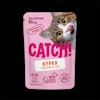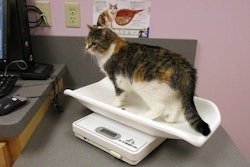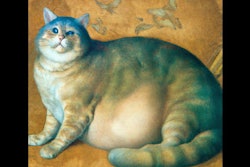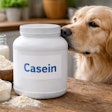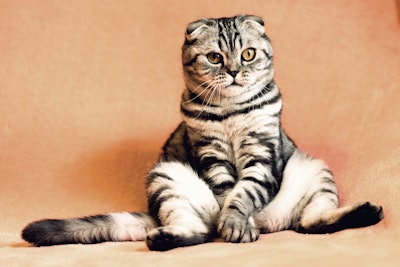
The humanization trend in pets is quickly extending to weight loss drugs. Vivani Medical, a biopharmaceutical company, recently announced results for its new miniature drug implant, OKV-119, designed to treat obesity and diabetes in cats.
The positive weight loss data was published in peer-reviewed BMC Veterinary Research. Vivani has partnered with Okava Pharmaceuticals to develop OKV-119 using their NanoPortal technology for feline prediabetes, diabetes and obesity. The results of the small study showed the implant treatment helped cats lose at least 5% of their body weight over 112 days.
Researchers estimated that up to 40% of the domestic cat population needs help managing their weight, and feline obesity is now one of the most common challenges encountered at veterinary offices, said Vivani. From previous reporting on PetfoodIndustry.com, a 2022 survey by the Association for Pet Obesity Prevention noted 61% of evaluated cats as overweight or obese.
“The data published in BMC Veterinary Research is further evidence that our proprietary NanoPortal implant technology holds promise in reducing obesity in cats,” said Adam Mendelsohn, Ph.D., Vivani president and CEO. “Felines share many pathophysiologic obesity phenotypes with humans, and our preclinical studies of NPM-115 and NPM-119 in other animal models, in addition to this cat data, support our efforts to clinically evaluate our miniature, subdermal GLP-1 implants for the treatment of chronic weight management in obese or overweight human patients and type 2 diabetes, respectively.
"Vivani is dedicated to rapidly developing our portfolio of weight loss focused implants as they collectively have the potential to improve medication adherence, tolerability and real-world patient results," Mendelsohn added.
Study design
The study included five purpose-bred neutered male cats. At the time of enrollment, the cats were 28 months old, weighed (median, range) 5.61 kg (5.14 –7.38 kg), and were considered healthy based on physical examination. The general health of each animal was assessed during the course of the 112-day study period.
To allow for the measurement of daily caloric intake, cats were individually housed in pens from Day − 6 to Day 28 and fed a standardized pelleted feline diet (Purina Cat Indoor formula), with 90 grams of fresh feed provided once daily in the morning. Cats were offered canned wet food (Friskies Meaty Bits) to induce eating if caloric intake was too restricted.
After Day 28, cats were removed from individual pens and were collectively provided 450 grams of the dry pelleted food for the remainder of the study period. The amount of food provided and consumed was recorded throughout the study. Water was supplied ad libitum. Daily physical exams were performed, while body weights were measured weekly. Weekly plasma samples were taken during the study for the measurement of exenatide concentrations.
The study evaluated the drug release characteristics of subcutaneous OKV-119 implants configured to release exenatide for 84 days. Key findings included:
- Long-term delivery: One OKV-119 implant released exenatide effectively for 3 months as designed.
- Weight loss: Cats lost weight when exposed to exenatide plasma concentrations between 1.5 ng/ml and 4 ng/ml.
- Health impact: Obesity in cats, like in humans, leads to shorter lifespans and health problems.
Vivani has separately demonstrated the delivery of exenatide over a 6-month duration both in vitro and in vivo (in a rat) and anticipates extending the duration of OKV-119 to 6 months for future studies.
Other weight loss efforts
In February, Better Choice, a pet health and wellness company and maker of Halo Elevate pet food brand, acquired Aimia Pet Healthco Inc. The company said the acquisition allowed it to be in a better position to manage the clinical trials internally in hopes to develop a supplement to support weight loss in domestic animals.
In addition to working with Animia to develop treats and toppers to safely combat pet obesity, Better Choice noted the goal of the research and development work between the companies is to mirror the weight loss benefits of leading brands for domestic animals and in humans including Slentrol, Wegovy, Ozempic and Mounjaro with added protein and nutrients from the company’s Halo products to promote lean muscle and overall pet health.

